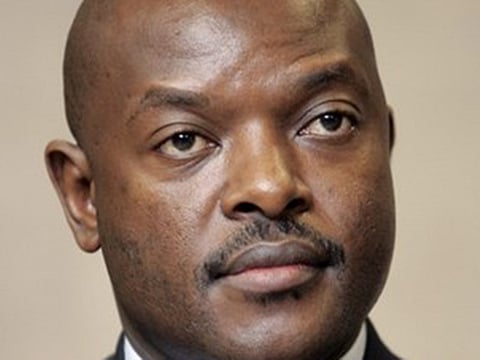Burundi president nominated by ruling party for third term
Opposition leader warned that any attempt to stay in power would destabilise the country

BUJUMBURA, Burundi: Burundi’s ruling party on Saturday nominated President Pierre Nkurunziza to be its candidate for a third term in elections on June 26, a move expected to stoke political tensions.
The party announced Saturday that Nkurunziza had been nominated unanimously and unopposed during a retreat for party leaders. On the streets of Bujumbura, Burundi’s capital, armed police were immediately deployed after the announcement.
Burundi’s constitution stipulates that a president can only serve for two terms, but Nkurunziza’s party says he is eligible for another term as popularly elected president because for his first term he was elected by lawmakers. Critics say this is not a proper interpretation of the law and he should not serve a third term.
Washington decried the move. In a statement, the US State Department said it “deeply regrets the decision.” ‘’With this decision, Burundi is losing a historic opportunity to strengthen its democracy by establishing a tradition of peaceful democratic transition,” the statement said.
More than 10,000 Burundians have fled to neighbouring Rwanda citing fears of election violence. Many of those in Rwanda say they left because of growing pressure to support Nkurunziza’s party, which is known by its initials as CNDD-FDD. Others alleged violent activities by the ruling party’s youth wing, known as Imbonerakure, according to the UN refugee agency.
Recently opposition groups have mounted pressure on Nkurunziza to retire, with some staging street protests against a third term. Police have used force to break up the rallies.
Earlier on Saturday before the ruling party announced its decision, opposition leader Agathon Rwasa urged Nkurunziza not to stand for another term, warning that any attempt to stay in power would destabilise the country. Rwasa told an independent radio broadcaster that Burundi is likely to descend into violence if the ruling party and the opposition do not start negotiations.
Nkurunziza came to power in 2005 after a peace process that ended civil war in Burundi, which has a history of ethnic strife.
Last week UN Human Rights Commissioner Zeid Ra’ad Al Hussain said Burundi was “at a crossroads,” warning that failure to hold free elections could return Burundi to what he called a “deeply troubled, tragic and horrendously violent past.”


![The incident occurred in the early hours of Tuesday in Kampani Zurak community, located in the Wase area of Plateau state. [Illustrative image]](http://media.assettype.com/gulfnews%2Fimport%2F2022%2F12%2F13%2FSTOCK-ambulance_1850a298a2c_large.jpg?w=320&auto=format%2Ccompress&fit=max)
